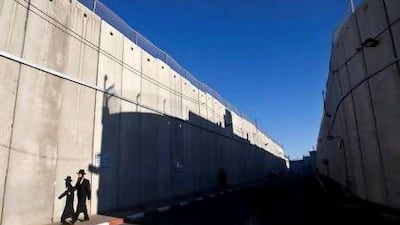JERUSALEM // Few things rile up Israeli Jews more than the suggestion that they have built an "apartheid state" on Palestinian territory.
The comparison of Israel's treatment of the Palestinians with the system of racial separation imposed by minority whites on majority blacks in South Africa for more than four decades is a direct challenge to their carefully cultivated self-image as a humane people who themselves have historically been victims of racist tyranny.
And so, when Gideon Levy, a columnist for the daily newspaper Haaretz, cited the results of an opinion poll suggesting Israelis were more nationalistic, racist and indeed, more in favour of apartheid than they cared to admit, he created a firestorm of controversy.
Writing last week about a survey purporting to show favourable Jewish-Israeli attitudes towards apartheid, he prompted withering criticism from the right wing and fellow liberals.
The first sentence of his report on the survey couldn't have been blunter: "Most of the Jewish public in Israel supports the establishment of an apartheid regime in Israel if it formally annexes the West Bank."
But in an interview with The National on Monday, Mr Levy, who is known for his pro-Palestinian sympathies, flatly dismissed the critics as people who "don't like to look into the mirror, especially if the mirror shows an unpleasant face".
The survey, carried out in September by a research group called Dialog that is led by a Tel Aviv University professor, found that 59 per cent of the 503 respondents wanted preferential treatment for Jews over Arab citizens of Israel in receiving government-ministry jobs.
Moreover, it cited 42 per cent of respondents as neither wanting to live in the same apartment building as Arabs, nor wanting their children to share classrooms with Arabs.
Haaretz, the most sympathetic Israeli newspaper to the Palestinian cause, printed the piece on page one. It used the headline: "Most Israelis support an apartheid regime in Israel" because, in part, 69 per cent of respondents said the West Bank's 2.5 million Palestinians should not be allowed to vote should Israel annex "territories" in the West Bank.
Mr Levy's article attracted a number of rebukes from the right wing. Writing in a Times of Israel blog last week, Ben-Dror Yemini, accused Mr Levy of lying.
He said that what Haaretz published last week was "one of the biggest manipulations in the history of incitement against Israel".
The Committee for Accuracy in Middle East Reporting in America, a United States-based media watchdog critical of perceived anti-Israel biases, called the article "Haaretz's apartheid campaign against Israel".
In response to the outcry, Haaretz this week changed the article's headline and issued a correction. The newspaper said its original headline "did not accurately reflect" the survey's findings because it failed to clarify that Israelis did not support voting rights to West Bank Palestinians in the "hypothetical" event of an Israeli annexation of parts of the territory.
In a column on Monday, Mr Levy apologised for the headline as "misleading" and admitted to inserting an error in an analysis article he also wrote last week. In that analysis - entitled "Apartheid without shame or guilt" - he incorrectly wrote the "majority doesn't want Arabs to vote for the Knesset, Arab neighbours at home or Arab students at school".
It was, he wrote in the mea culpa, "not a majority - just a [large] portion of Israelis espouse these frightening views. Cold comfort".
Mr Levy, 59, and his emotive writing style have sparked plenty of anger before - he once received an email from a reader that said: "Thank you for the wonderful article, Adolf Hitler."
Nor is he the first of Haaretz's liberal assemblage of writers to invoke apartheid to describe Israel's 45-year occupation of the West Bank, east Jerusalem and the Gaza Strip.
Palestinians believe that these territories should form part of their independent state, an aspiration that is being thwarted by Israel's expanding settlements.
In an article this month, Akiva Eldar, another arch-critic of Israel's pro-settler, right-wing government, cited government statistics to argue that Jews now form a minority when factoring in non-Jewish populations in the territories under Israeli control. The numbers proved that "apartheid exists", he wrote.
While Mr Levy has stood by the thrust of his reporting and analysis on the apartheid poll, some Haaretz colleagues have not.
Yehuda Ben Meir, a fellow columnist, wrote in the newspaper on Sunday that the survey proved the opposite of the conclusions reached by Mr Levy. As 48 per cent of respondents opposed annexing Palestinian territories with Jewish settlements in them, he said this showed the "same majority is also unwilling to live in a country with an 'apartheid regime'". (Thirty-eight per cent favoured annexation.)
While acknowledging "room for improvement in Israeli society", Ben Meir added the "article does an injustice to the State of Israel, the Jewish people and the truth".
In another Haaretz opinion article published on Monday, Shany Mor, senior research associate at the Britain Israel Communications and Research Centre, took a shot at Mr Levy for his "poor reading" of the survey.
Further, he criticised both the newspaper and the survey itself for "misleading translations", "sloppily worded questions", "dubious" use of data that produced "misrepresentations of opinion" and "agenda-driven editorialising".
Tamar Hermann, senior fellow at the Israel Democracy Institute and an expert on public-opinion research, agreed the questions in the survey should have been worded more clearly, saying they lacked "precision". She also said Haaretz could have been more upfront about the organisation that commissioned it: the Yisraela Goldblum Fund, which has links to liberal organisations.
But insistent during the interview, Mr Levy said Israelis "can't defy reality".
Apart from the error in his analysis article, he said, his reporting on the apartheid survey "was totally precise".
Follow
The National
on
& Hugh Naylor on

